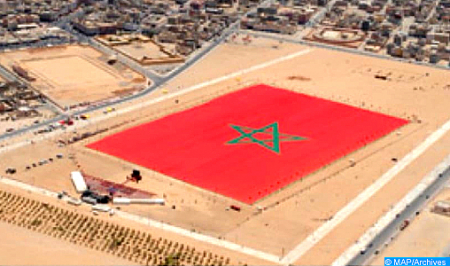Moroccan Diplomacy, Under Leadership of HM the King, on the Way to Definitively Settle Artificial Dispute over Sahara – Chilean News Website –
Moroccan diplomacy, led by HM King Mohammed VI, a “visionary sovereign of the 21st century”, has made the necessary progress to settle, once and for all, the artificial dispute over the Moroccan Sahara, underlines Chilean news website “ElSiete”. In an Op-ed published under the title “Moroccan diplomacy paves the way for the settlement of the dispute in the Sahara”, the Chilean media outlet highlights the victories reaped on the ground by the Kingdom’s diplomacy, by revealing the baseless allegations and disinformation campaigns carried out for more than four decades by Algeria. The author of the article, Ernestina Fuentes, stresses the fact that “the recent recognition by Spain of the Moroccan plan for autonomy in the Sahara, which does not allow any other interpretation, (…) has constituted a definitive turning point which demonstrates that conflicts can never be resolved with slogans, but rather through serious, practical and credible political proposals, as Morocco did at the United Nations with its Initiative for the negotiation of an autonomy in the Sahara”. According to the Chilean portal, the Moroccan initiative continues to garner support around the world, in addition to the recognition of the United States and the support provided by Germany, Arab countries and the European Union. ElSiete quotes Eric Cameron, president of the Norwegian NGO World Action for Refugees, in this regard, who believes that “with this broad support from the international community, and in addition to the important and influential member states of the UN, other countries will follow this virtuous dynamic”. The author of the article notes that it would not be “surprising to see that in Latin America, where parliaments mainly support the Moroccan proposal, the new scenario would open the eyes of supporters of separatism to the initiative of autonomy in the Sahara, in the context of an increasingly strong awareness that dialogue and the immutable principles of defense of democracy and human rights are the appropriate way to resolve conflicts and ensure a dignified life for the refugees who, for more than 40 years, have been held in the Tindouf camps in Algeria.” Ernestina Fuentes concludes that when the vast majority of countries in the world welcome Spain’s stance in this conflict, they are only recognizing “a concrete reality, which admits neither virtual republics, nor dogmas and even less outdated ideologies from the Cold War era that violate fundamental principles of human coexistence”.

